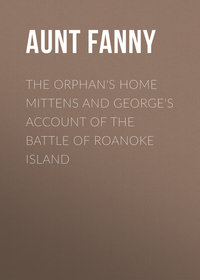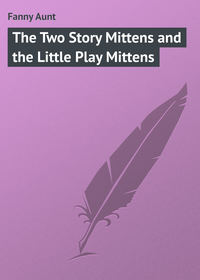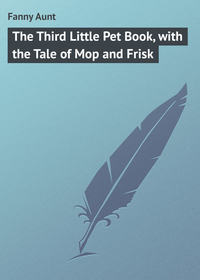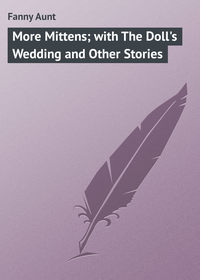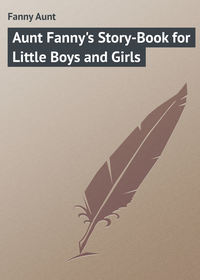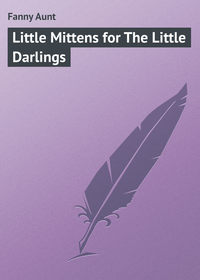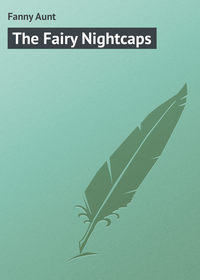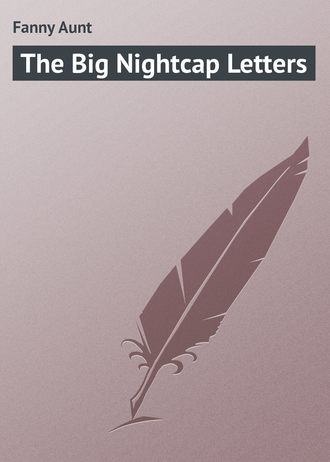 полная версия
полная версияThe Big Nightcap Letters

Fanny Aunt
The Big Nightcap Letters Being the Fifth Book of the Series
PREFACE
It has always been my favorite theory, that the goodness and beauty of a truly Christian life in children could be taught quite as effectually by combining the gay with the grave, as by being altogether grave; for I chanced to remember that I invariably omitted all the latter portions of the story-books bestowed upon me when a child; and I have reason to believe that human nature is pretty much the same now as then.
In each of these little stories, it has been my single aim to inculcate a desire in children to do good, to be good, and to seek prayerful assistance from the One source of all goodness – their Father in Heaven.
And now one word about the sixth book of this series. Trembling with a deep responsibility, I have ventured to write a fairy story, (that enchanted ground for the little ones,) through the whole of which I trust this thread of my theory has run unbroken. It is the last of our little friend, Lame Charley; and if the dear children who have made his Nightcaps theirs, will bear him, and me for his sake, in affectionate remembrance, it will gladden the heart of their loving
Aunt Fanny.THE FIRST LETTER.
INTRODUCTION
One evening, when all the children, after the usual frolic with Crocus the cat and the tremendous dog, had settled themselves for their "nightcaps," (their meaning of which word, of course, you all know,) the little mother cleared her throat, and paused, for she was feeling for a letter that was in her pocket.
"Something particularly good is coming to-night," whispered George to Anna.
"What makes you think so?"
"Don't you see how bright her eyes are? See! now she is hugging Charley, and kissing him;" and unable to resist this loving exhibition, he rushed from his seat to hug and kiss Charley, too, and ask him if he felt quite comfortable.
Charley thanked him with a loving look, and George went back to his seat, all in a glow.
"Children," said the little mother, "I received to-day a letter from Aunt Fanny! She says you have given her so many delightful stories, she thinks it is quite time to give you some in return."
"Did you ever!" exclaimed the children, eagerly. "What a perfect bird of an Aunt Fanny! How perfectly delightful!"
"She wishes me to ask how you would like her to send you each a story, that you would know had been written especially for you?"
"Oh! oh! oh! what a capital idea!" cried all the children, clapping their hands at such a rate, that an old bachelor opposite opened the window and looked out with a spy-glass, to see where the fire was; and nearly frightened a lamplighter into fits, who was just at that very moment lighting a lamp at his door.
This most delightful announcement made the children chatter so fast, that Charley became nearly sick, laughing at what they said; for George again called Aunt Fanny a "perfect bird!" and Harry improved it by exclaiming that she was a perfect cat bird! which, of course, meant something very complimentary.
"Won't she write stories like a mice!" cried Johnny.
"And won't mamma read the writing like a precious kitten!" said Clara.
"Well, I never knew kittens could read writing before," laughed Harry.
"But, mamma," said Anna, "the letter looks very thick; is the first story in it?"
"Yes," said the little mother. "I will read what Aunt Fanny says – she says —
"And now, dear children, what do you think? Do you remember the story of the 'Doctor' in the first Nightcap book? Well, that very doctor is now a young lady; and she has written a story on purpose for our dear little Charley. I think it is very charming; and I have sent it for the very first one, because I well know this will best please his loving brothers and sisters. Sarah, (the real name of the 'doctor,' you know,) has tried to write what would most gratify Charley's sweet and tender nature." Here the little mother stopped, and kissed her lame boy, and the children murmured, "dear, dear Charley." Then she read on —
"You will perceive that Sarah has endeavored to imitate the beautiful German style. Here is her story. Give Charley a kiss for us both before you begin."
And in almost breathless silence the mother read the title —
"THE LITTLE WHITE ANGEL"Some children stood in a group before the door of the village school-house one lovely summer evening.
"They were all talking pleasantly together, from Kline, the son of the rich and proud Hoffmeister, to little blue-eyed Carl, the only child of the poor baker.
"It is very true that Kline wore a velvet jacket, richly embroidered, while Carl's coat was old, and his wooden shoes were rough enough, in all conscience; but what of that? If they were good friends, what difference did that make, I should like to know? Wait till children become grown people, for pity's sake, before you expect them to measure each other's worth by what they possess or wear!
"'The new schoolmaster, Meinherr Friedrich, comes to-morrow,' said Otto. 'I am so glad. I was weary of that old Master Hoffman, with his crooked problems and hard lessons.'
"'So was I, truly,' cried Kline, who, although a good merry boy, hated his books as he did medicine.
"'Ah, thou didst always like play better than work, my Kline,' said Max, 'and so do I. Meinherr Friedrich will be wise if he keep me and thee apart during school hours; but come, see which can get home first – one, two, three!' and away they all scampered, laughing and shouting as only schoolboys can.
"The following day, the boys were all standing around the schoolhouse, when the door opened, and Master Friedrich himself, appeared, and cried in a cheery, hearty voice, 'Welcome, my children.'
"'Welcome, master,' cried they.
"And now they entered and took their seats, and were quite still while the good master read a short chapter in the Book of Books; and then reverently kneeling, prayed that the dear Jesus would guide him in his teachings, and bless them, and send His Holy Spirit to watch over them all.
"School began; the thumb-worn books were brought out – the lazy boys began to sigh and frown, and wish impatiently for the recess, and wonder why Latin dictionaries were ever invented; when, as if by magic, they found themselves listening to the pleasant voice of Master Friedrich, and actually understanding their lessons, so clear and simple were his explanations; and the time for recess came, to their great astonishment, long before they had expected.
"When the studies were over, the master drew from his desk a box; and whilst the children gathered around, he opened it and drew out charming little pink-and-white seashells, pretty pictures, and many other beautiful things, which he gave to the children, with loving words.
"But the most lovely thing of all, was a little porcelain statuette of an angel. She stood, so fair, so pure – with her small white hands folded upon her breast, and her eyes uplifted, that the children gazed enchanted.
"'Oh the dear angel! the beautiful angel!' cried they all. 'Wilt thou not give it to me, Master Friedrich?'
"But the good master smiled, and said – 'The little angel is too lovely to be given to any boy who is not good and true of heart. We shall presently see who shall deserve her. He who brings me, to-morrow, the brightest thing on earth, shall have the angel.'
"At this the children looked at each other, as if wondering what the good master might mean; but he said no more, and they went home thoughtful.
"The next day, after the lessons (which had now become so pleasant) were finished, the children clustered around the master to show him what they had brought.
"Some of the smaller ones had picked up sparkling stones on the road, and as they held them in the sunlight, were sure they must be something bright and precious.
"Some had polished up a shilling, until it shone like a little crown. Heinrich brought a watch-crystal, which his father had given him, and which he considered a wonder of transparent brightness; and Kline, the rich Hoffmeister's son, had brought a paste buckle, made to imitate diamonds, than which, in his opinion, nothing could be brighter.
"All these things were laid on the schoolmaster's desk, side by side. The shillings shone away famously, the pebbles and watch-crystal did their best, but Kline's buckle was the bravest of all.
"'Ah! mine's the brightest!' shouted Kline, clapping his hands.
"'But where is little Carl?' said Master Friedrich. 'He ran out just now.'
"All eyes were turned to the door, when presently, in rushed Carl, breathless. In his hands, held up lovingly against his neck, was a poor little snow-white dove. Some crimson drops upon the downy breast, showed that it was wounded.
"'Oh! master!' cried Carl, 'I was looking for something bright, when I came upon this poor little white dove. A cruel hawk had wounded it, and I caught it quickly, and ran here. Oh! I fear it will die!'
"Even as he spoke, the dove's soft eyes grew filmy; it nestled closer in Carl's neck, gave a faint cry, and died.
"Carl sank on his knees beside the master's desk, and from his eyes there fell upon the white dove's poor broken wing, two tears, large and bright.
"The master took the poor dead dove from his hands, and laid it tenderly down on the desk with the bright things; then raising Carl, he softly said —
"'My children, there is no brighter gem on earth, than a tender, pitying tear.'
"The boys were silent for a moment, for they felt that the master had decided that Carl had rightly won the angel, and then Kline cried out —
"'Nay, master, thou didst not fairly explain to us. I pray thee give us yet another trial.'
"'Yes, dear master,' said Max 'give us one more trial.'
"'What sayest thou Carl?' said Master Friedrich.
"'Yes, dear master,' answered the generous boy.
"The good master smiled thoughtfully, and his eyes rested for a moment, lovingly, upon Carl; then glancing round, he said – 'He who brings me the loveliest thing on earth to-morrow, shall have the angel.'
"The children clapped their hands, and departed satisfied.
"After school, the next day, Kline was the first to run up to Master Friedrich, and lay upon his desk what he considered the loveliest thing in the whole world – his new soldier cap, with the long scarlet feather, and bright golden tassel. Max came next, and placed beside the cap a small silver watch, his last birthday gift, with a bright steel chain attached. Otto brought a great picture-book, just sent him by his godmother; Rudolph a tiny marble vase, richly sculptured; and so on, until a still more motley collection than before lay upon Master Friedrich's desk.
"Then little Carl stepped modestly up, and placed in the master's hand a pure white lily. The rich perfume filled the room; and bending over the flower, and inhaling the delicious fragrance, the master softly said – 'My children, the blessed Word of God says – Consider the lilies of the field, how they grow; they toil not, neither do they spin, and yet I say unto you, that even Solomon in all his glory was not arrayed like one of these. Carl has rightly chosen.'
"But murmurs arose; the children were not satisfied; and again they asked for another trial. And as before, good Master Friedrich inquired —
"'What sayest thou, Carl?' and he answered as before, with generous haste, 'Yes, dear master.'
"'Now this is the last time,' said the master. 'He who brings me the best thing on earth shall have the angel.'
"'The very best thing on earth is plum cake!' cried Kline, on the third day, as he walked up to the desk, bearing a large cake, richly frosted, with a wreath of sugar roses round the edge. This he placed triumphantly before the master, sure of the prize.
"'Nay, thou art wrong this time, Kline,' said Max. 'I asked my father what was the very best thing on earth, and he laughed, and gave me this golden guilder; the prize is mine.'
"'Ah! but my father said that the very best was a good glass of Rhenish wine,' cried Otto, 'and I have brought a bottle of it thirty years old; the prize is surely mine.'
"So they went on till all had placed their offering before the master.
"'And thou, Carl?' said he. 'What hast thou brought which thou thinkest the best on earth?'
"A crimson flush rose to the little boy's forehead, and coming softly forward, he took from his breast a small, worn Testament, pressed it to his lips, and then reverently laid it down with the rest as he said, in a sweet, low voice —
"'My mother, dear master, says that God's precious Testament is far before all other possessions.'
"''Tis thine, my Carl!' cried the master, snatching the boy to his breast. 'The white angel is thine! for there is nothing in the wide, wide world half so precious as the blessed words of Jesus;' and he placed the angel in the hands of the trembling boy.
"Kline knit his brows, and gazed with anger and disappointment at the little Carl; and the rest, seeing him do this, felt themselves aggrieved; but suddenly the cloud cleared from Kline's face, and rushing forward, he caught Carl in his arms, crying – 'Forgive me, dear Carl! now I am right glad thou hast won the prize!'
"Ah! the blessed effect of a bright example! Quickly joining hands, the children danced joyfully around the little Carl, who stood in the midst, the white angel pressed to his breast, his fair hair falling in curls on his shoulders, and his blue eyes full of holy tears.
"The good Master Friedrich also wept for joy, and prayed, from the depth of his pure and simple heart, that Jesus would bless this lesson to the children's everlasting good. He had turned away that none might perceive his tears.
"But One in heaven saw them, Master Friedrich."
The story was finished, but no one spoke, for the tears were softly falling from Charley's eyes; and the rest of the children, with quivering lips, were gazing in his face. At last he said, in a low voice – "What a lovely story! and how sweet and good little Carl was! Dear mamma! we will all try to be generous and good, as he was; and we all know what a precious book the Bible is. I love Carl; and I thank Aunt Fanny and Miss Sarah with all my heart, for writing this beautiful story about him."
And now all the children, with subdued and tender glances, kissed their dear mother and Charley, and went quietly to bed, thinking of the dear little Carl, and wishing softly to each other, that their mother had thought of asking them to find the "brightest and loveliest and best thing on earth," for they hoped they should have done just as the dear Carl did.
THE SECOND LETTER.
HEEDLESS HARRY
For HarryDear Harry: – I have happened upon an odd story of a heedless namesake of yours, and as you are a dear head-over-heels little fellow, I think you will be both amused and instructed by reading it; or at any rate, you will resolve never to cut any thing like the very extraordinary capers the other Harry did, either in the vegetable or travelling line. Once, when you were a very little fellow and were visiting at a cousin's house in the country, you busied yourself all one morning, pulling up radishes, eating the roots, and then setting the tops back in the earth, and when the gardener came to gather some for tea, he found them all wilted and flat to the ground. Do you remember how you had to run for it, when he caught sight of you laughing at him? and how his having the rheumatism in his knee, so that he could not move fast, was all that saved you from a good thrashing? I do. So here is the story, and hoping it will be very serviceable in helping you to "mend your ways," I am your loving
Aunt Fanny."HEEDLESS HARRY"'Oh! how I do hate to write exercises!' exclaimed Harry, one Monday afternoon in the summer time; 'what's the use? they are abominable!' and he stamped his foot and threw down his pen, clapped his hat on his head, and rushed out of the front door.
"No wonder he was called 'heedless' Harry; for he was so thoughtless, that he never stopped one moment to reflect, when he set about doing any thing, whether or not it would get him into trouble; and consequently he was always in some scrape or other. He was old enough, certainly, to know better, and pleasant enough, in other respects, to be liked very much by all who knew him. He was full of fun, perfectly fearless, and bore an accidental scratch or tumble like a man. But, dear me! what a heedless, careless little scamp! That very morning, before school began, his mother had sent him into the garden to gather vegetables. He cut the carrots so that they would stand up on end, and with great onions began knocking them down, as if they were tenpins; then he had a game of jack-straws with some small slender beans, and ended the vegetable business by stringing a dozen red peppers and tying them round the cat's neck, making her sneeze her head nearly off; for the poor thing went 'tchitz! tchitz! tchitz!' for a quarter of an hour.
"When he was tired of laughing at her, he marched away to skip stones in the brook, and ended by slipping on the bank and tumbling into the water, and treating himself to a very thorough ducking.
"Harry lived with his parents on a large pleasant farm, about twenty miles from the city of New York. He had never been in New York; and this afternoon, at which my story commences, when he rushed to the front door, he put his hand in his pockets and said to himself: 'I've a great mind to run away! I know I shall catch it to-morrow, about that old exercise, and I can't write it. I won't! now!'
"He walked to the fence, and climbing up, looked over into a neighbor's meadow.
"A beautiful white horse was quietly grazing, and lazily switching the flies off his back with his long and silken tail.
"'Halloo!' exclaimed heedless Harry, 'there's Lightfoot! Jolly! what a chance to go off on my travels! I'll catch him. There! now he is drinking out of the brook. I'll go and jump on his back.'
"As usual, the little scapegrace had entirely forgotten that the horse was very swift and spirited, and also that he did not belong to him or his parents. So Harry, with one bound, jumped the fence, paying no kind of attention to a great thorn which tore down the leg of his pantaloons for half a yard, ran up to Lightfoot, caught him with one hand by his flowing mane, placed the other on his back, and tried to mount him.
"Horses are animals, but they are not stupid or fools for all that. So Lightfoot, while he kept his nose in the brook, had been quietly watching Harry out of the corner of his eye; and when the young gentleman tried to jump on his back, the horse gave a quick little start to one side, and a knowing flourish with his tail, which sent Mr. Harry plump into the brook for the second time that day, and then Lightfoot scampered off with a neigh which sounded remarkably like a horse laugh.
"The angry boy scrambled up the low bank like a lame grasshopper, and screamed out, 'You hateful old thing! I will get on your back! see if I don't!' So he cut a stout branch from a tree, stripped it, made it whistle through the air, and with a spiteful chuckle advanced once more upon Lightfoot.
"The horse gave another neigh. Harry approached him softly, hiding the whip behind him, smoothed his neck, and patted his side, and then, with a sudden spring, leaped upon his back.
"Lightfoot stood perfectly still. Then Harry clucked his tongue against his palate to coax him to go.
"But the horse pretended not to hear him. 'Get up! Get up!' cried Harry. 'Come now, get up, I tell you.'
"Lightfoot went on eating, as if there was nobody within a mile of him.
"Harry became more and more impatient; he thumped the horse with his knees, and drummed with his heels, and finding that did no good, he raised the switch, to strike him.
"Lightfoot was a 'cute' Yankee horse, he wasn't 'raised' in Vermont for nothing; so when he caught sight of the switch, he ducked his head, and off went Harry like a flash of lightning, and found himself sprawling on the grass.
"You would think that was enough; and that Harry, after all these gymnastics, would go home like a boy that had some sense pounded into him by all these hard knocks. Not at all. Up he sprang, ran to Lightfoot, and jumped for the third time upon his back.
"'Get up! Get up! you goose!' he cried. This time the horse heard him, without any doubt; he gave a nourish with his long tail, cleared the fence with a bound, and rushed down the road like an arrow shot from a bow.
"And now our young friend would gladly have dismounted, but that was easier thought of than done. To get off a horse in full gallop may not be difficult, if you are not particular whether you come down on your heels or your head. Harry reflected, that though possibly his head might be harder than the stones in the road, and the stones would be hurt the most, yet there was rather a chance that the stones might crack his head instead, so he concluded to hold on if he could.
"On dashed Lightfoot for miles and miles, with Harry clinging for dear life to his neck and mane. At last they approached a large town, and Lightfoot stopped of his own accord at a public house.
"Out came the landlord, staring with surprise, and lifted Harry off, half-dead with fatigue and fright, while the hostler led the horse to the stable.
"After the heedless boy had washed his face and brushed his clothes, he felt better, but desperately hungry; there was no fun in that; so he concluded to hunt up a dinner.
"When he entered the dining-room, the people looked at him from head to foot. Of course this was because they were admiring him, he thought; so he drew himself up, and putting on an air of dignity, as if he was a gentleman on his travels, he said: 'I want my dinner. Bring me a beefsteak, some potatoes, and an apple-dumpling.'
"At these words the landlord advanced, put his hand on Harry's shoulder, and said: 'Who are you?'
"Harry preferred eating to talking just then, so he answered: 'Give me a beefsteak directly. When I have eaten my dinner I will tell you my history.'
"'Um! we'll see – tell it to me this instant, or you may get your dinner as you can, like a gipsy under a fence – but you won't have any here.'
"'I will have it,' cried Harry, in a rage.
"'You shan't!' said the landlord.
"'I will!' cried Harry.
"'John,' said the landlord to the waiter, 'I forbid your bringing any dinner to this impertinent little scamp.'
"'Impertinent yourself!' screamed Harry, nearly beside himself with passion; and he seized a glass to throw it in the landlord's face.
"At this riotous noise, some more servants and the landlady rushed into the room; and the latter screaming out, 'You little wretch!' and snatching up a broomstick, rushed full tilt at Harry, who, concluding that it was best not to wait for the fight, jumped over the table, darted out of the door, and flew up the street.
"He ran for a long time, as if a mad dog were after him, until he had gained the outskirts of the town, and stopping, breathless and exhausted, began to reflect upon his situation.
"We always make remarkably wise reflections when we are suffering from our misconduct. Harry began to think he had been acting very like a donkey, and would very willingly have returned home, and taken to studying his hated lessons.
"Night was now approaching; the twilight deepened and darkened; and it was only by the stars which came peeping out one by one, that he could see his way. A strange feeling of dread and loneliness came over him, and he was rejoiced at last to see dimly before him a large barn. Jumping the fence, he went up and tried the door; fortunately it was open, and our heedless friend was glad enough to throw himself down on a heap of fragrant hay, and spite of his hunger, was soon in a dreamless sleep.
"The dismal screech (for it isn't crowing) of one of those long-legged Shanghai roosters, awoke him just as the dawn was streaking the sky; and shaking the hay from his dress, Harry went out into the road again.
"He was walking along, wondering whether he should ever see home again. A market-wagon came up behind him, and he turned to inquire his way.


